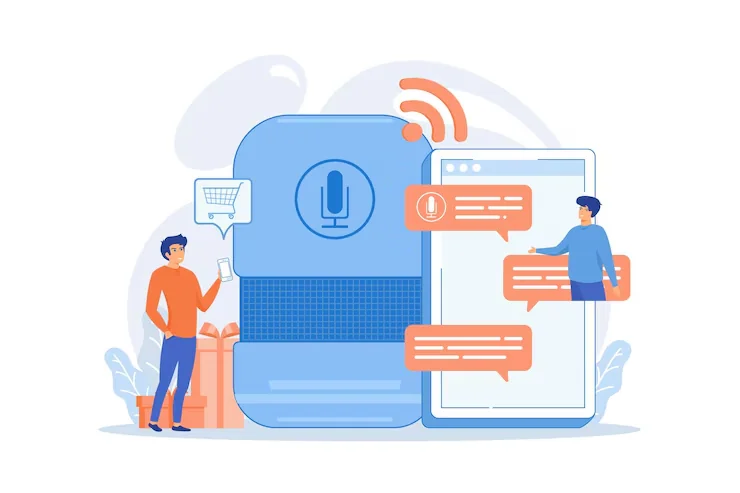The Integration of AI in App Development: Trends and Future Prospects
Artificial Intelligence (AI) is no longer just a sci-fi concept; it’s now a big part of our everyday lives, especially in the world of app development. AI is changing how apps are made and how they work, making them smarter, more personal, and more user-friendly. This change isn’t just a trend; it’s a new way of creating apps that can do things we once thought were impossible.
The AI in mobile apps market worldwide is projected to reach $251.1 billion by 2033. The fusion of artificial intelligence and app development is no longer a trend; it’s necessary for businesses looking to stay ahead.
Imagine using an application that predicts what you need before you even think of it, a virtual assistant that understands your questions and gives helpful answers, or a security feature that constantly adapts to keep your data safe. These advancements are possible because of AI. AI helps apps provide better user experiences, automate repetitive tasks, and enhance security.
This blog explores AI’s current trends and future prospects in app development.
Current Trends in AI and App Development
The landscape of AI and mobile app development is evolving rapidly. And, here are some current trends that you should focus on:
Personalized User Experience
AI algorithms have significantly enhanced user personalization. By analyzing user data, AI can predict user preferences and behaviors, offering tailored content. Apps like Netflix and Spotify utilize AI to suggest movies, shows, and music, providing a unique experience for each user. This personalized approach improves user satisfaction and increases user engagement and retention.
Voice Assistants and Chatbots

Voice assistants such as Siri, Alexa, and Google Assistant are becoming integral to many applications. These AI-driven tools enable users to interact with apps using natural language, making the user experience more seamless and intuitive. Additionally, chatbots are increasingly used for customer service, providing instant support and resolving queries. This diminishes the need for human intervention and speeds up response times.
Enhanced Security
Security is a critical concern in app development, and AI offers robust solutions to enhance it. AI-powered security features, such as facial recognition, fingerprint scanning, and behavioral biometrics, help detect and prevent fraudulent activities. These technologies analyze patterns and behaviors to identify potential security threats, providing a higher level of protection for users.
Automation and Efficiency
AI has introduced automation in various aspects of app development, improving efficiency and reducing the workload for developers. Automated testing tools and AI-driven code suggestions are now standard practices, allowing developers to focus on more complex and creative tasks.
Predictive Analytics
Predictive analytics is a powerful tool that helps businesses understand and predict user behavior. AI analyzes large datasets to identify patterns and trends, enabling apps to offer proactive solutions and recommendations. For example, e-commerce apps use predictive analytics to forecast sales, manage inventory, and create targeted marketing campaigns. This helps businesses make informed decisions and stay ahead of the competition.
Future Prospects of AI in App Development
The future of AI in mobile app development looks very promising. As AI continues to evolve, we can expect to see even more groundbreaking applications and innovations.
Advanced Machine Learning Models
As AI technology advances, more sophisticated Machine Learning models will be integrated into apps. These models will offer deeper insights and more accurate predictions, enhancing the functionality and user experience of applications. For instance, AI-driven financial apps will be able to provide better investment advice and risk management strategies.
Augmented Reality (AR) and Virtual Reality (VR)

AI will play a crucial role in enhancing AR and VR experiences, making them more immersive and interactive. This will revolutionize various sectors, including gaming, education, and training. For example, AI can enhance VR training simulations by adapting scenarios in real-time based on user actions, providing a more effective learning experience.
Natural Language Processing (NLP)
Improved Natural Language Processing (NLP) capabilities will make voice assistants and chatbots more conversational and capable of understanding complex queries. This will enhance user interaction, making it more natural and efficient. Future NLP advancements will allow apps to understand context better and provide more accurate responses.
AI in IoT Integration
AI will enhance the Internet of Things (IoT) by making interconnected devices smarter. Apps will be able to manage and control various IoT devices more efficiently. For example, smart home apps will use AI to learn user preferences and automate household tasks, such as adjusting the thermostat or managing energy consumption.
Hyper-Personalization
The future of AI in apps will focus on hyper-personalization, where apps will not just recommend but also predict and act on user needs before they are explicitly stated. For instance, a travel app could proactively suggest destinations, accommodations, and activities based on past travel history and preferences, providing a highly customized experience.
Ethical AI and Privacy Concerns
As AI continues to evolve, addressing ethical concerns and ensuring user privacy will be paramount. Future developments will focus on creating transparent and fair AI systems. Developers will need to implement practices that ensure data privacy and comply with regulations, such as the General Data Protection Regulation (GDPR). Ethical AI will involve designing algorithms that avoid bias and ensure fair treatment of all users.
Challenges in Integrating AI in App Development
While AI offers immense potential for app development, it also presents a set of challenges.
Data Privacy and Security
Handling user data responsibly and ensuring compliance with privacy regulations is a significant challenge. Developers must implement robust data protection measures to prevent breaches and misuse of personal information. Ensuring transparency in data collection and usage practices is also essential to gain user trust.
High Development Costs
Developing AI-powered apps can be costly, requiring specialized skills and resources. Small businesses and startups may find it challenging to afford the initial investment. However, as AI technology becomes more accessible and cost-effective, these barriers are likely to decrease over time.
Complexity in Implementation
Integrating AI into apps requires a deep understanding of Machine Learning and data science. The complexity of developing and training AI models can be time-consuming and resource-intensive. Developers need to stay updated with the latest AI advancements and continuously improve their skills to effectively implement AI solutions.
Continuous Learning and Adaptation
AI models need constant updating and training to stay relevant and effective. This demands ongoing effort and investment. Developers must monitor AI performance, gather new data, and refine algorithms to ensure optimal functionality. Continuous learning is essential to keep up with the dynamic nature of AI technology.
Summary
The integration of AI in app development is an exciting and rapidly evolving field. With current trends showcasing the potential of AI to transform user experiences and prospects promising even more innovative applications, the role of AI in app development will only continue to grow. However, developers must navigate the challenges carefully to harness the full potential of AI while ensuring ethical and secure implementation.









